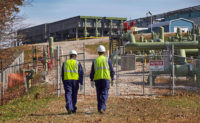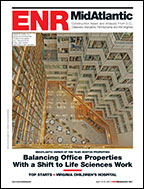If there is a bellwether for the region's commercial development market, it is Gensler. With activity trending upward toward pre-recession levels, Gensler's recent pipeline of projects has helped it move up three notches to fifth place on ENR New York's Top Design Firms ranking. Through a tough economic environment, Gensler stuck to its strengths, maintained close client relationships and positioned itself to capitalize on a commercial rebound.
With a staff of 400 in New York and 94 in its Morristown, N.J., office, the firm is also involved in an array of community service and industry organizations throughout the tristate region. These include soup kitchens, walkathons and numerous other charity events as well as the ACE Mentor Program.
Given its recent success, the editors of Engineering News-Record's regional publications named Gensler the New York region's Design Firm of the Year.
Like other firms, Gensler struggled during the recession. In 2008, it generated $116.88 million in revenue in New York, New Jersey and Connecticut. The following year that revenue tumbled 34% to $76.92 million. The firm has been able to rebuild business, however, as evidenced by a revenue jump from $86.75 million in 2011 to $111.65 million in 2012.
The firm says it recorded $65.19 million in the commercial sector last year, more than three times the revenue of its nearest competitor. Joe Brancato, Gensler's co-regional managing principal, credits the firm's ability to stay on top of the changing commercial environment during the past five years.
"In the downturn, we stuck with our clients, and even though we didn't do as much work, we kept sharing knowledge and research with them," Brancato says. "As things have turned around, we are back to doing business for them."
Corporate headquarters jobs helped to significantly increase its workload. In March 2012, crews completed the new five-story, 325,000-sq-ft BASF North American Headquarters in Florham Park, N.J. The project is certified under the U.S. Green Building Council's rating system as LEED Double Platinum for both commercial interiors as well as core and shell. It is the first project in New Jersey to achieve that designation.
Work is set for completion this August on the Gensler-designed, 12-story Two Riverfront Center in Newark, which will serve as the North American headquarters for Panasonic. Gensler also served as architect on the new 560,000-sq-ft Bayer Healthcare project in Whippany, N.J., which broke ground in 2012 and is scheduled for completion this summer. The project reworked an existing campus to create a new headquarters for Bayer.
The Bayer project is emblematic of the firm's recent efforts to help reposition existing properties. Brancato says many owners and developers are taking advantage of recent low-interest financing to invest in properties. "We see a lot of buildings from the '70s and '80s that are not working for corporate clients today," he says. "We can reposition—and in some cases completely transform them—to improve a facility so a corporation can use it for the next 30 years."
Gensler is also doing makeovers of buildings in New York City. TIAA-CREF acquired 685 Third Avenue in 2010 to reposition it as a multi-tenant office building. Gensler's work on the project, which is scheduled for completion in June, included significant upgrades to the main entrance, lobby and adjacent pocket park.
Brancato says the firm's brand group has been particularly helpful with "creating the story" for a repositioned property while its graphics team can create marketing collateral and websites for real estate agents.
Robin Klehr Avia, Gensler co-regional managing principal and current board chair, says the firm draws heavily from its extensive experience in interiors to create buildings with spaces that work well for clients. "We have an inside-out approach to design," she says. "It's about clients, their customers, their employees and the users of the space. That's the earmark of who we are as a firm."
For About.com, Gensler designed a 45,000-sq-ft space in New York City that aims to instill a cultural shift in the company after it was sold by The New York Times Co. to IAC/InterActiveCorp in September. Featuring prominent branding elements throughout, the open-plan layout was designed to promote interaction and communication between coworkers, including a "central boulevard" that serves as a connection for both the space and the staff. The project was completed in November.
Similarly, the firm created a new collaborative 22,000-sq-ft workspace for Calvin Klein Jeans at its Fashion Avenue headquarters in Manhattan last November. The open-space layout aims to accentuate the company's brand and includes an immense collection of fashion samples within the one-floor space.
Meanwhile, Gensler added a workplace studio to its New York office and two new studios in Morristown. Between those offices, the firm increased personnel in the region by 12% last year. While Gensler strives to promote from within to retain culture, the firm plans to hire talent that bolsters its services, Avia says. "We only look to hire people who are better than we are," she says.
Brancato says the additional studios continue the firm's tradition of creating a small office feel within a large firm. The New York office now boasts 14 studios, while Morristown has four.
Although Gensler has tasted success in recent years, Brancato says he urges his senior staff to "stay hungry."
"We might be the Goliath of our profession," he says, "but we act like the David."







Post a comment to this article
Report Abusive Comment